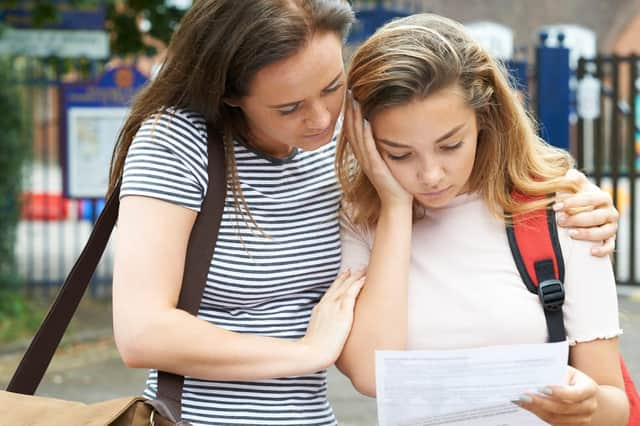This is how to appeal your GCSE and A level results


More than half a million pupils have been unable to sit their A level and GCSE exams this year, after all examinations were cancelled due to the coronavirus pandemic.
Instead, pupils’ results were to be based on predicted outcomes, with teachers required to award a “calculated grade” based on previous performance in subjects.
Advertisement
Hide AdAdvertisement
Hide AdHowever, on 12 August the government announced a swift change to allow students to use their grades from mock exams.
The change came just a day before A level pupils are due to receive their results on 13 August and follows problems with grading in Scotland earlier this month, which saw 120,000 students downgraded in the moderation process.
How will exams be graded?
Exam results in England will now be awarded via a new ‘triple lock’ process which will give pupils added security when they receive their grades, the Education Secretary has announced.
The new process is intended to provide pupils with an additional safety net to the system of calculated grades.
Advertisement
Hide AdAdvertisement
Hide AdStudents now have a choice of accepting their calculated grade, appealing to receive a valid mock result, or to sit their exams in autumn.
All three grades will hold the same value with universities, colleges and employers, the Department for Education has said.
At the request of the government, all schools were asked by Ofqual, the office of qualifications and examinations regulation, to send exam boards two pieces of information for each subject, by 29 May.
This included:
- The grade schools believe students would have most likely got if exams had taken place as planned. These are referred to as CAGs or Centre Assessed Grades.
- A ranked list of all students within each grade for each subject
Every school was asked to consider a wide range of evidence, including classwork, non-exam assessments, mock exams, and previous results in the subject.
Advertisement
Hide AdAdvertisement
Hide AdEducation Secretary Gavin Williamson said: “By ensuring students have the safety net of their mock results, as well as the chance of sitting autumn exams, we are creating a triple lock process to ensure confidence and fairness in the system.
“No one wanted to cancel exams – they are the best form of assessment, but the disruption caused by Covid-19 meant they were not possible.
“This triple lock system will help provide reassurance to students and ensure they are able to progress with the next stage of their lives.”
The grades A level students receive on Thursday (13 August) will be based on the judgement of their school or college, and have been moderated by exam boards to ensure the same standard is applied for all students, regardless of which school, college or part of the country they come from.
Advertisement
Hide AdAdvertisement
Hide AdGCSE students will receive their results a week later on 20 August.
Can results be appealed?
In the event pupils are unhappy with the grade they are awarded, the right to appeal will be tightly restricted.
Pupils will be able to use their mock exam results as the basis for an appeal if they are higher than the calculated grade.
Regulator Ofqual will be asked to determine how and when valid mock results can be used, with schools being required to submit the evidence to the exam board.
Advertisement
Hide AdAdvertisement
Hide AdPupils will also still be able to sit their exams in the autumn if they are unhappy with the grades they secured in their mocks, or if they are dissatisfied with results awarded by exam boards.
However, if students believe a mistake was made in their grading, they cannot directly appeal their results themselves, as only schools are allowed to submit an appeal.
How to appeal results
Pupils can challenge the result of a GCSE, AS level or A level qualification if:
- their school or college made a mistake when sending the grading information
- their school or college thinks the result is wrong
- they have evidence of wrongdoing, including discrimination
When a review is requested the mark may be changed if the reviewer thinks it’s wrong, although it may be higher or lower than the original grade. You or your school may have to pay if the mark is not changed.
Advertisement
Hide AdAdvertisement
Hide AdIf you are unhappy with the decision of the review, an appeal can then be made to Ofqual. This must be made within 15 days of getting the result of a review.
The deadline to submit a review for GCSE and A and AS levels is 17 September 2020.
Further information on how to submit an appeal can be found in the Ofqual guide online.
If you cannot apply online, or have further questions about the appeal process, you can call Ofqual on 0300 303 334, or email [email protected].